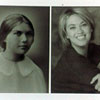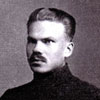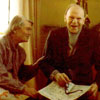Pauline Sinberg-Snieckus
 Pauline Sinberg was born aboard a ship sailing in the Crimean waters in 1897. She grew up in an Estonian settlement near the Black Sea. Pauline emigrated from Crimea to Estonia in 1926 where she studied at Tartu University in the hopes of becoming a veterinarian. The following year she was developing a program that would eradicate tuberculosis in cattle.
Pauline Sinberg was born aboard a ship sailing in the Crimean waters in 1897. She grew up in an Estonian settlement near the Black Sea. Pauline emigrated from Crimea to Estonia in 1926 where she studied at Tartu University in the hopes of becoming a veterinarian. The following year she was developing a program that would eradicate tuberculosis in cattle.
 In 1928, Pauline married Dr. Victoras Snieckus, a Lithuanian veterinarian. She moved to Lithuania and became the director of the Lithuanian Veterinary Bacteriological Institute and later served as an assistant professor at the Lithuania Veterinary College. Pauline and Victoras had one son named Victor.
In 1928, Pauline married Dr. Victoras Snieckus, a Lithuanian veterinarian. She moved to Lithuania and became the director of the Lithuanian Veterinary Bacteriological Institute and later served as an assistant professor at the Lithuania Veterinary College. Pauline and Victoras had one son named Victor.
During the Second World War, the Snieckus family escaped to Germany along with thousands of other Baltic refugees. In 1948, after receiving an invitation from the Linderman family who were living in Foremost, Alberta, the Snieckus family immigrated to Canada. Pauline knew Rosalie Linderman from their time growing up in the Crimea. Upon arrival the Snieckus family worked at the Linderman farm.
The Snieckus family moved to Calgary to find permanent work. Pauline worked as a cleaning lady while Victoras obtained a job as a meat inspector. Pauline enrolled in evening classes and completed a Nurses' Aid diploma in 1950. However, she yearned to once again practice veterinary medicine. The following year she gained employment at the 9 th Avenue Animal Clinic; however, her education at Tartu University, one of Europe's most distinguished universities, was not formally recognized. At the age of 60 she wrote an exam at the University of Alberta that would allow her to continue her career in veterinary medicine. For ten years Pauline specialized in animal disease diagnosis.
Pauline and Victoras' son Victor studied at Queens University in Kingston, Ontario and became an internationally-known organic chemist. In 2009, Dr. Victor Snieckus received an honorary degree from the Tallinn University of technology in recognition of his accomplishments in organic chemistry research.
 While living in Calgary, the Snieckus family were proud members of Calgary's Estonian community. Pauline held an executive position with the Calgary Estonian Society and directed many of its activities. She was also an Estonian representative on Calgary Citizenship Council. Her dear Rosalie Linderman made the occasional trip from Foremost to participate in Estonian activities.
While living in Calgary, the Snieckus family were proud members of Calgary's Estonian community. Pauline held an executive position with the Calgary Estonian Society and directed many of its activities. She was also an Estonian representative on Calgary Citizenship Council. Her dear Rosalie Linderman made the occasional trip from Foremost to participate in Estonian activities.
Upon retirement Pauline relocated to southern Ontario where she actively participated in a number of Estonian festivals. She passed away at the age of 102 in Elora, Ontario leaving behind one son, grandchildren, and several highly regarded scientific journals. Throughout her career, Pauline constantly faced obstacles trying to pursue a career that, at the time, was designated for men only. Women were strongly discouraged from becoming involved with veterinary medicine. For her efforts, she was acknowledged by the Canadian Pioneer Women's Veterinary project in 1994








